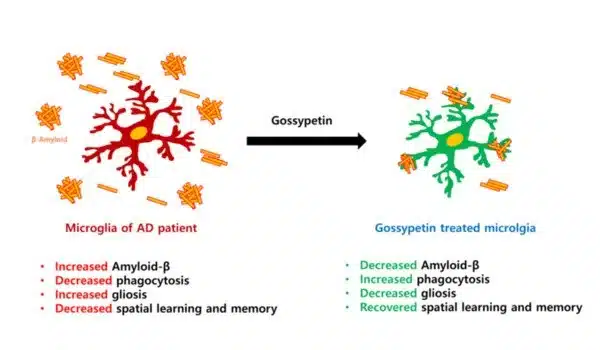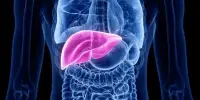Gossypetin is a flavonoid compound that is found in many plants, including hibiscus. Flavonoids are known to have antioxidant and anti-inflammatory properties, which have been associated with a reduced risk of cognitive decline and dementia.
There is some evidence to suggest that gossypetin may be effective in the treatment of Alzheimer’s disease. In a study published in the Journal of Alzheimer’s Disease, researchers found that gossypetin was able to reduce the levels of beta-amyloid, a protein that is found in the brains of Alzheimer’s patients and is believed to contribute to the development of the disease.
A study found that gossypetin activates immune cells in the brain that clear A beta, which causes Alzheimer’s disease. A cup of ruby red hibiscus tea not only warms the body in the winter, but it is also known to boost the immune system, control blood pressure, and help with weight loss. Another reason to drink this tea: it may help fight Alzheimer’s disease.
Professor Kyong-Tai Kim and Ph.D. candidate Kyung Won Jo from POSTECH’s Department of Life Sciences have confirmed that the gossypetin found in hibiscus activates microglia, the brain’s resident immune cell. The researchers also demonstrated that microglia in the brain scavenge amyloid-beta (Aβ) to alleviate cognitive impairments caused by Alzheimer’s disease (AD).
We have confirmed that removing Aβ aggregates deposited in the brain is effective in preventing and treating dementia. Gossypetin from hibiscus will contribute to the development of a safe and affordable drug for patients suffering from AD.
Professor Kyong-Tai Kim
Alzheimer’s disease begins when Aβ and Tau protein aggregates form deposits in brain tissue. To protect the brain, microglia internalize such aggregates (phagocytosis). However, repeated exposure to Aβ will eventually exhaust the microglia, resulting in a chronic inflammatory response and nerve cell damage. As a result of this, the victim experiences cognitive decline and memory loss.
The POSTECH team focused on gossypetin, a flavonoid compound found in hibiscus, also known as Hibiscus sabdariffa or roselle, while looking for a new AD treatment with no serious side effects.
The study was conducted in mice, so it is not yet clear whether gossypetin will be effective in humans. However, the findings are promising, and further research is needed to explore the potential of gossypetin as a treatment for Alzheimer’s disease.

The researchers administered gossypetin intragastrically to AD model mice for three months and found that their impaired memory and cognition were nearly restored to normal levels. Furthermore, they observed a decrease in the various types of Aβ aggregates, which are commonly found in the brain tissue of people suffering from Alzheimer’s disease.
The researchers then worked with Professor Jong Kyoung Kim (POSTECH’s Department of Life Sciences) to perform single-cell RNA sequencing. The study found that gossypetin inhibited the expression of genes linked to gliosis, which promotes chronic inflammatory responses, while increasing the expression of genes linked to Aβ phagocytosis. In other words, gossypetin facilitated Aβ clearance by microglia.
Professor Kyong-Tai Kim explained, “We have confirmed that removing Aβ aggregates deposited in the brain is effective in preventing and treating dementia. Gossypetin from hibiscus will contribute to the development of a safe and affordable drug for patients suffering from AD.”
It’s important to note that while some studies suggest that certain compounds found in plants may have potential health benefits, it’s generally not advisable to rely solely on supplements or natural remedies for treating medical conditions. It’s always best to consult with a healthcare professional before starting any new treatment.
















